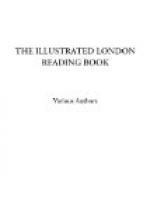[Illustrated: TURKISH WATER-CARRIER]
The Dancing Dervises are a religious order of Mohamedans, who affect a great deal of patience, humility, and charity. Part of their religious observance consists in dancing or whirling their bodies round with the greatest rapidity imaginable, to the sound of a flute; and long practice has enabled them to do this without suffering the least inconvenience from the strange movement.
In Eastern countries, the bread is generally made in the form of a large thin cake, which is torn and folded up, almost like a sheet of paper; it can then be used (as knives and forks are not employed by the Orientals) for the purpose of rolling together a mouthful of meat, or supping up gravy and vegetables, at the meals.
[Illustration: DANCING DERVISE.]
* * * * *
ON STUDY.
Studies serve for delight, for ornament, and for ability. The chief use for delight is in privateness and retiring; for ornament, is in discourse; and for ability, is in the judgment and disposition of business. For expert men can execute, and perhaps judge of particulars one by one; but the general counsels, and the plots, and marshalling of affairs, come best from those that are learned. To spend too much time in studies, is sloth; to use them too much for ornament, is affectation; to make judgment wholly by their rules, is the humour of a scholar. They perfect nature, and are perfected by experience; for natural abilities are like natural plants, that need pruning by duty; and studies themselves do give forth directions too much at large, except they be bounded in by experience. Crafty men contemn studies, simple men admire them, and wise men use them: for they teach not their own use, but that is a wisdom without them, and above them, won by observation. Read not to contradict and confute, nor to believe and take for granted; not to find talk and discourse, but to weigh and consider. Some books are to be tasted, others to be swallowed, and some few to be chewed and digested: that is, some books are to be read only in parts; others to be read, but not curiously; and some few to be read wholly, and with diligence and attention. Some books also may be read by deputy, and extracts made of them by others; but that should be only in the less important arguments, and the meaner sorts of books; else distilled books are like common distilled waters, flashy things. Reading maketh a full man; conference a ready man; and writing an exact man. And, therefore, if a man write little, he had need have a great memory; if he confer little, he had need have a present wit; and if he read little, he had need have much cunning, to seem to know that he doth not.
BACON.
* * * * *




